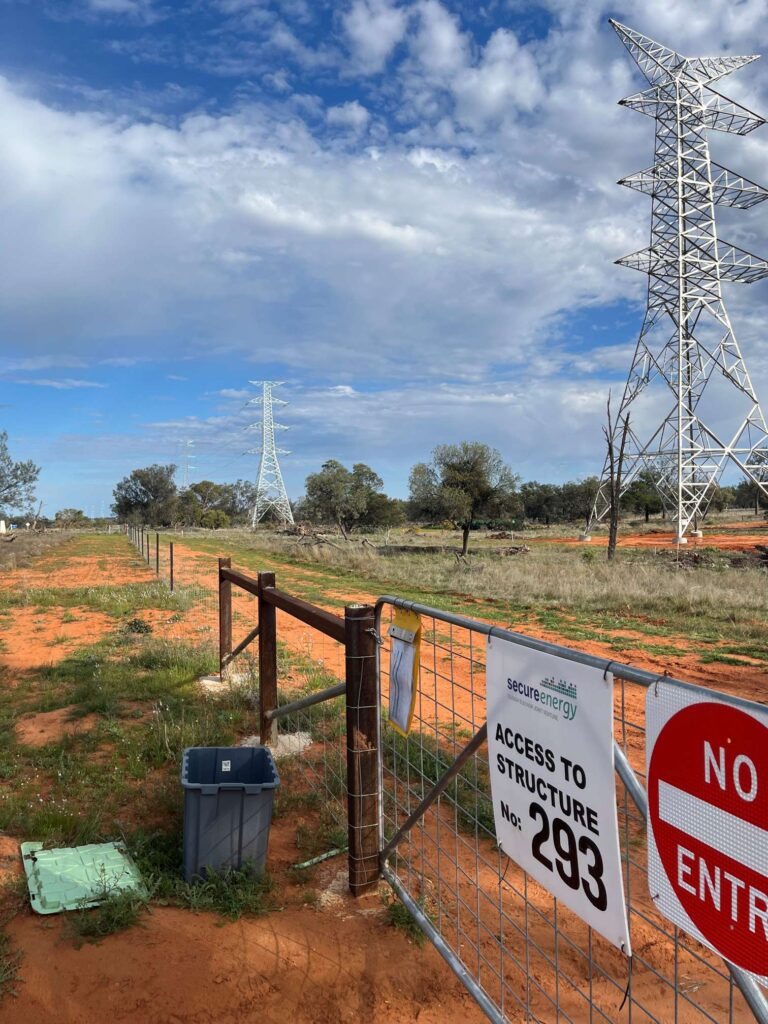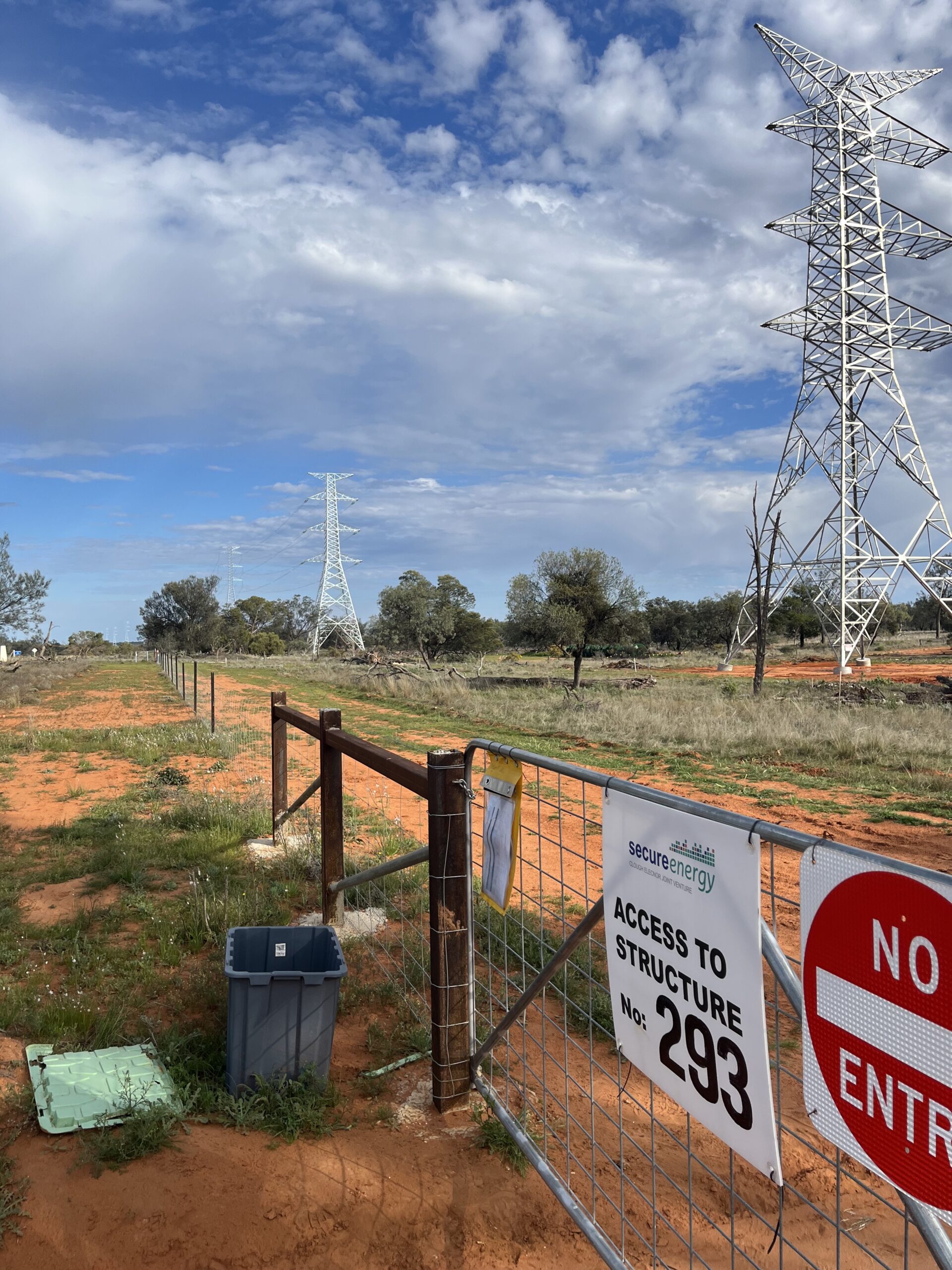Australia’s biggest renewable energy transmission project has been plagued with poor working conditions, exploitation of migrant workers and attempts to block unions from exposing its secrets.
Project Energy Connect is Australia’s biggest transmission project building 900km of transmission lines from Robertstown South Australia to Wagga Wagga in NSW and forking off into Red Cliffs in Victoria from Buronga, NSW. It is the missing link that will connect $20B worth of renewable energy generation sources with the national electricity grid, unlocking 330kV of power to Australian consumers.
The project is slated to create 1500 jobs in NSW alone, but despite being a major project with significant government funding, the project has so far had a poor track record of working conditions, safety standards and worker exploitation. Earlier this year head contractor, Green Light Contractors, repeatedly obstructed the ETU’s attempts to lawfully enter the site to speak to workers about their safety, rights and conditions until legal action forced it to allow organisers to enter.
Work health and safety breaches
Once ETU officials were able to enter the site, they discovered poor living conditions and safety standards. Many of the work groups fly or drive in and out to camps dotted along the project in remote areas. Serious injuries have occurred with no planned access for emergency services and no SafeWork NSW oversight or investigation. One line worker recently received a leg injury that involved a deep gash to his bone that required around 50 stitches. Transgrid, who is managing the larger NSW portion of the project refused to consult with the Union about safety issues and any remedial steps to improve safety conditions.
Poor working conditions
Weather conditions on site feature extreme heat during summer and freezing temperatures in winter. Despite this, workers have no weather respite on the HVTL tower erection sites. They don’t even have eating facilities or adequate toilet facilities. Lunch is a bag of cold leftovers from the previous night’s camp meal and there is no refrigeration for meals. Workers are only routinely paid for 10 hours of a 12-hour day and workers do not accrue long service leave. Misclassification of roles means electrical workers are being underpaid and under the wrong award. A camp allowance of $40 per day was removed with no explanation.
ETU National Industry Coordinator Matt Murphy visited the Project multiple times and spoke to workers who had genuine concerns about working conditions and safety.
“The working conditions on this project are disgraceful, and not befitting of a landmark project that should lead by example in the renewable energy industry. It is a huge red flag that these contractors have been trying to prevent the Union from investigating these issues on site, and the government can’t ignore them, said Matt.
“For this to be the standard on a project that receives government funding is unbelievable.”
A green light for migrant exploitation
In August, the ETU exposed the Albanese Government for greenlighting migrant exploitation when they signed off on a labour migration agreement that will see 400 temporary visa workers brought to Australia to work on the project for $10 less an hour than industry standard.
“This is a disgraceful move from Immigration Minister Andrew Giles, who should hang his head in shame. His rhetoric on migrant workers does not match his actions. He has rubber-stamped workplace inequality based on visa status,” said ETU NSW State Secretary Allen Hicks.
“The government was fully aware that this company wants access to 400 migrant workers but has not committed to employ a single Australian apprentice on this project. It beggars belief that it would be signed off anyway,” said ETU National Secretary Michael Wright.
“The ETU will use every political, legal and industrial tool at its disposal to ensure this is the last rotten deal,” said Michael.
Where to from here?
The Union is fighting hard to negotiate agreements for this project to protect workers and raise standards, wages and conditions. We’re facing a major workforce shortage as the nation transitions to net zero so overseas workers will be needed to fill the gap – but their wages and conditions must match industry standards, or we will see a race to the bottom for all workers’ pay and conditions. When these workers come, we must encourage them to join the Union to protect them from exploitation and strengthen the workforce as a whole.
This project should lead the way in the renewable energy industry, and just like any other industry we must use our collective might to make it happen. As an emerging and growing industry, we have a lot of work to do to unionise the sector, but with the strength and solidarity of over 60,000 members, we know we can get it done. When ETU members lead the way, we know our future will be brighter than ever.

